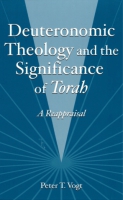Deuteronomic Theology and the Significance of Torah
A Reappraisal
Peter T. Vogt
One of the few areas of consensus in modern Deuteronomy scholarship is the contention that within the book of Deuteronomy there is a program of reform that was nothing short of revolutionary. Although there are divergent views regarding the specific details of this revolutionary program, most scholars agree that, in fundamental and profound ways, Deuteronomy was radical in its vision. This vision was expressed in key ideas: centralization of worship, secularization, and demythologization (of earlier traditions). However, Vogt argues that these ideas fail to account adequately for the data of the text of Deuteronomy itself. Instead, he claims, at the heart of Deuteronomic theology is the principle of the supremacy of Yahweh, which is to be acknowledged by all generations of Israelites through adherence to Torah. Thus, the book of Deuteronomy is in fact radical and countercultural but not in the ways that are usually adduced. It is radical in its rejection of ANE models of kingship and institutional permanence, in its emphasis on the holiness of life lived out before Yahweh, and in its elevation of Yahweh and his Torah.
- Description
- Table of Contents
In the introductory chapter, the structure and ideology of the book are examined. Chapter 1 then examines some of the ways in which the theology of Deuteronomy has been understood, namely, in terms of centralization, secularization, and demythologization. Chapters 2–5 evaluate key texts that are used to support the idea that centralization, secularization, and demythologization are at the heart of the theology of Deuteronomy. An alternative reading of the texts is presented that highlights the supremacy of Yahweh and Torah. The final chapter investigates the theological and ideological implications of this alternative reading of key texts.
Introduction
Historical Background
The Aim and Method of the Present Work
Ideology and Structure in Deuteronomy
1. Centralization, Secularization, and Demythologization in Deuteronomy
Centralization in Deuteronomy
Secularization and Demythologization in Deuteronomy
The Ideology (ies) of Centralization, Secularization, and Demythologization
2. The Appointment of Judges and Torah: Deuteronomy 1:9-18
Prevailing View: Secularization of Judicial Procedure Evaluation
Alternative View: Yahweh and Torah for All Times
Conclusions regarding Deuteronomy 1:9-18
3. The Presence of Yahweh and Torah: Deuteronomy 4:1-6:9
Deuteronomy 4
Deuteronomy 5:1-6:9
4. The Supremacy of the Giver of Torah: Deuteronomy 12
Prevailing View: Radical Reform
Evaluation
Alternative View: The Supremacy of Yahweh
Conclusions regarding Deuteronomy 12
5. Political Administration and Torah: Deuteronomy 16:18-18:22
Prevailing View: Centralization and Secularization
Alternative View: Supremacy of Yahweh and Torah
Conclusions regarding Deuteronomy 16:18-18:22
Implications and Conclusions
Indexes
Index of Authors
Index of Scripture
Mailing List
Subscribe to our mailing list and be notified about new titles, journals and catalogs.




